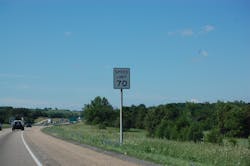As the National Transportation Safety Board (NTSB) gears up to push recommendations for increased enforcement of roadway speed limits, Gary Biller, president of the National Motorists Association, a driver advocacy organization, argues in this guest column that motives other than reducing vehicle crashes may be at work.
Why does the NTSB want to change its goal of providing legitimate highway safety research into an advocacy of ever-present, for-profit enforcement aimed primarily at safe drivers who are endangering no one?
In a sweeping set of recommendations from its July 25, 2017 public meeting, the NTSB threw down a draconian gauntlet: More point-to-point tracking of vehicles via speed cameras, abolishment of the long-accepted engineering principle from the Federal Highway Administration (FHWA) Manual on Uniform Traffic Control Devices of setting speed limits based on normal traffic flow, and an increase in the hundreds of millions of dollars of federal (read as: taxpayer-funded) grants that are divvied out among the states to run year-round ticketing campaigns.
The NTSB wants to reduce traffic fatalities by slowing traffic down. Why the heavy-handed approach based on a false premise?
The agency has perpetuated the myth that that nearly one-third of fatalities on the nation’s highways are speeding-related. But “speeding-related” is an interesting term. It is intended to signify that speed may have been a factor in an accident, although not necessarily the primary cause. Speeding-related as defined by the National Highway Traffic Safety Administration (NHTSA) also does not necessarily mean that the vehicles involved in a fatal crash were exceeding the posted speed limit.
TheNewspaper.com dug into the statistics from NHTSA’s Fatality Analysis Reporting System (FARS) database while also reviewing state annual highway safety reports that are submitted to qualify for NHTSA grants. In a 2012 report, TheNewspaper found that “… of the 2.7 million traffic accidents recorded in twenty-five states over the course of a year, only 1.6% were caused by drivers who exceeded the posted speed limit.”
Those results are remarkably similar to those found by a government study conducted in the United Kingdom (U.K.) some years ago. The U.K. Department for Transport found that just 2% of accidents among drivers over age 25 were caused by exceeding the speed limit.
Most recently, TheNewspaper reviewed FARS crash data from 2015 – the latest available from NHTSA – and found that, of the 48,613 drivers involved in fatal accidents across the country that year, 7% were reported to be exceeding the speed limit at the time of the crash, with 77% deemed not to be engaged in speeding-related actions.
The NTSB is greatly exaggerating the speeding issue and its effect on road safety. The agency favors expensive and intrusive highway surveillance combined with lower posted speed limits that will have little effect on normal traffic speeds.
Meanwhile, the lower speed limits get, the more crashes that are classified as speeding-related. And where the limits are set so low as to be violated by nearly all drivers – an all-too-common occurrence – all crashes will end up being called speed-related.
We have just described a self-perpetuating revenue-generating machine, one that will fine drivers for every misstep, real or imagined.
Do we want a government that is constantly monitoring and penalizing every perceived driver indiscretion primarily to generate enforcement profits? That is what we’ll have unless drivers en masse condemn proposals like that from the NTSB to their federal and state elected officials.
About the Author
Gary Biller
Gary Biller was president of the National Motorists Association from 2009 to 2023. Biller retired in 2023.

